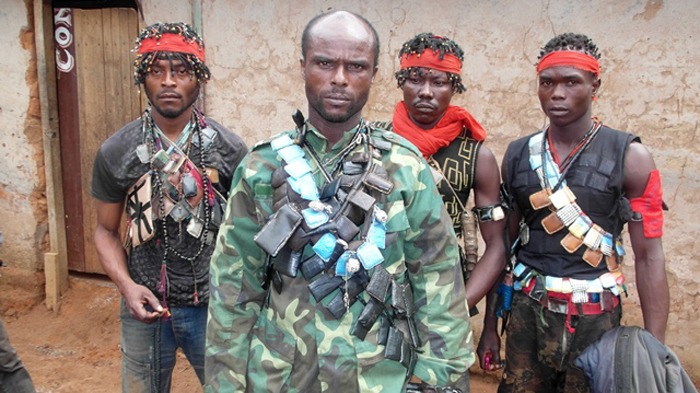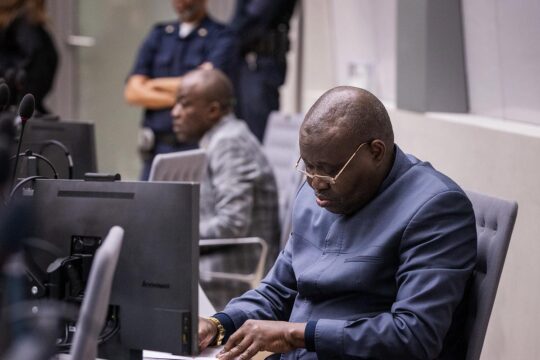Context: The Central African Republic has been plagued by conflict and military coups ever since independence from France in 1960. The latest conflict broke out in March 2013, when Muslim-dominated Seleka rebels deposed longtime leader Francois Bozizé and began a reign of terror, looting and burning homes and killing civilians perceived to be allied with the former government. The response of mostly-Christian home grown rebel groups, known as Anti-balaka, was just as vicious. Beginning in August 2013, Anti-balaka groups began targeting Muslims in retaliation against the Seleka, and eventually deposed the Seleka ruling alliance in December. Despite the swearing-in of a transitional government and the deployment of international forces from the African Union, France, and the UN, fighting continued throughout 2014.
The majority of CAR’s Muslim population is displaced or has fled to neighbouring countries like Chad and Cameroon. According to the UNHCR, Muslims remain at high risk of attack as anti-balaka members often surround their neighbourhoods, prevent access to food and water, and kill them if they attempt to leave. Human Rights Watch investigator Peter Bouckaert remarked in early 2014, “At this rate…there will be no Muslims left in much of the CAR.” Human rights groups accuse both sides in the conflict of ethnic cleansing. Fighting continues between armed groups, and civilians are often targeted for killings.
In this climate of intense violence, CAR’s domestic judicial system has failed to provide any kind of recourse for victims. According to Amnesty International, basic judicial institutions such as the police or prosecutor’s office have not existed in many parts of the country for years. There is little political incentive for the transitional government to attempt prosecutions of perpetrators, since much of the security structure continues to be controlled by various rebel factions opposed to the government. Different rebel groups fight for control over key towns, while the government does not control much territory even in the capital. Many employees of the judicial system do not go to work for fear they will be killed.
Anti-balaka militia leader Rodrigue Ngaibona, known as “Andilo”, was nevertheless arrested by the UN force Minusca on January 17, 2015, some 300 km north of the capital Bangui. “Andilo” had been wanted for months for murder, rebellion, rape and looting, according to Bangui Attorney General Maurice Dibert Dollet. Dollet does not rule out the possibility that the suspect be tried by the International Criminal Court, which is investigating crimes committed in the CAR.
Transitional justice mechanisms
Jean-Pierre Bemba trial at the ICC: The ICC is already trying Congolese Senator and former vice-president Jean-Pierre Bemba for ordering crimes committed in the CAR in 2002 and 2003 by former rebels of his MLC movement, notably murder and rape as crimes against humanity and war crimes. The trial started on November 22, 2010, and the presentation of evidence closed on April 7, 2014.
ICC Investigation into crimes since 2012: In September 2014, ICC Prosecutor Fatou Bensouda announced she was opening a second investigation into crimes committed in the Central African Republic (CAR) since 2012. This followed a preliminary examination and a request from the CAR’s transitional president Catherine Samba-Panza (elected by the interim parliament in January 2014) to investigate. “My Office has gathered and scrupulously analysed relevant information from multiple reliable sources,” Bensouda said. “Based on this independent and comprehensive analysis, I have concluded that an investigation is warranted. The information available provides a reasonable basis to believe that both the Seleka and the anti-Balaka groups have committed crimes against humanity and war crimes.”
These crimes include murder, rape, forced displacement, persecution, pillaging, attacks against humanitarian missions and the use of children under fifteen in combat, according to the Prosecutor. Her announcement was welcomed by organizations such as the International Federation for Human Rights (FIDH), Central African Human Rights League (LCDH) and Central African Human Rights Monitor (OCDH).
Proposed UN-backed Special Court: In August 2014, the CAR government and UN mission in the country, MINUSCA, agreed on the formation of a special court to hear cases of human rights violations including sexual violence and violations of children’s rights. On April 22, the transitional parliament finally approved a law to set up the Court.
The Special Court is to be composed of 27 judges, including 14 Central Africans and 13 internationals. Its President will be Central African, while the prosecution is to be led by a foreigner. According to the law adopted by the transitional parliament and signed into law by President Catherine Samba-Panza on June 3, 2015, , the Court will be able to prosecute crimes committed from 2003, when former president François Bozizé staged a coup against another ex-president, Ange-Félix Patassé. The next step will be to raise funds from the international community to make the Court a reality.
Civil society members have also proposed a truth and reconciliation commission.






